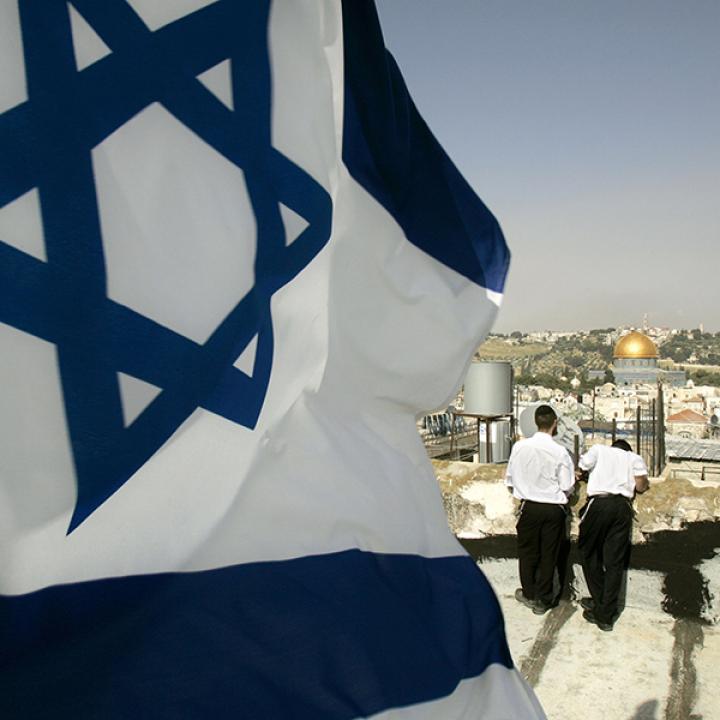

The growing threat of Arab-Israeli war, the Iranian nuclear issue, and the potential for Palestinian political meltdown could make this year a precarious one for Israel.
The many dangers lurking in the Middle East are likely to spell conflict, not peace. Characterizing the coming year as "critical" for Israel's security has been a staple of Middle East analysts for the past 64 years. Sometimes it is, sometimes it isn't. With Israel facing a perfect storm of potentially catastrophic regional trends, 2013 definitely is.
First, Israel finds itself as the place where the Middle East's two mega-trends -- the threat of Iran's hegemonic ambitions and the spread of radical Sunni extremism -- find common cause. While these two trends battle against each other in Syria, Bahrain and elsewhere, the recent Gaza conflict highlighted a neat, if sometimes competitive, division of labor -- with Iran providing rockets to Hamas and Sunni states such as Qatar, Egypt and Turkey providing Hamas with vital political support. It is not a cause for celebration that jihad against Israel has succeeded in unifying the region's radical Shiites and radical Sunnis.
Second, Israel looks at the neighborhood around it and, for the first time in a generation, can imagine a descent into war. We tend to forget that it has been 40 years since Israel has engaged in state-to-state conflict. The years have been so full of terrorist attacks, intifadas and katyusha rockets that we take for granted that no country on Israel's borders has waged old-fashioned war against the Jewish state since 1973. Alas, with the emergence of Islamist Egypt and a likely Islamist Syria -- the allies in the last Arab-Israeli war -- that "40-year peace" may now be coming to a close. This doesn't mean that war will break out soon; both the Egyptians and Syrians have enormous domestic problems to settle first. But the fundamental shift from leaders who saw peace (or, in the Syrian case, the absence of war) as a strategic asset to new leaders for whom the fight against the Zionist enterprise is an ideological mission has profoundly negative implications.
Third, in the view of most experts, the clock may finally be about to run out on the long-running drama of the Iran nuclear face-off. Despite heavy international sanctions, Tehran is marching toward a nuclear bomb, and most experts expect it to cross a key threshold in its accumulation of fissile material during 2013. The Obama administration is likely to offer Iran a "big bargain" over nukes and sanctions, but the Supreme Leader may reject even an overly generous proposal as a poison pill that could undermine his hold on power. For President Obama, who has embraced the concept of "prevention," that leaves military action as a real possibility. Indeed, in early December, both Dennis Ross and Elliott Abrams -- the policy insiders who ran much of U.S. Middle East policy for the past quarter-century -- said publicly they believed either America or Israel is likely to use military force against Iran in 2013.
Fourth, confrontation with Iran could very well occur at the same time as Israel's closer neighbors, the Palestinians, have a political meltdown -- the collapse of what's left of the 20-year-old Oslo framework of conflict resolution and Palestinian self-government. The problem is not just that there have been only two weeks of formal Arab-Israeli negotiations over the past four years -- the least since the Johnson administration. The underlying issue concerns the profound reluctance of many Palestinian leaders both to accept the concept of a Jewish national home and to negotiate the creation of a Palestinian national home. It concerns the still potent allure of violent "resistance" offered by Hamas. It concerns the stunning indifference of Arab states to fulfill promises of financial support to the Palestinians. And, to be fair, it concerns the deep division among Israelis as to whether they are willing to bear the political, social, financial and military costs of real territorial compromise, which would almost certainly include pulling out tens of thousands of Jewish settlers from the West Bank, particularly if Israel gets only a conditional or temporary peace in return.
Taken together, these trends have eroded confidence in the very idea of peace, which in turn has placed huge pressure on what's left of Oslo. Especially at risk is the Palestinian Authority, whose operation frees Israel from the daily governance of more than 2 million people. Over the next year, the demise of the P.A., the collapse of Palestinian security cooperation with Israel and the emergence of a religious Islamist-Jewish conflict in place of a nationalist Arab-Israeli conflict are all very real, and very damaging, prospects.
Lastly, all of this occurs at a moment when both allies and adversaries in the Middle East are uncertain about U.S. leadership. Numerous crises, from the Islamist power grab in Egypt to the brutal repression in Syria to the P.A.'s creeping demise, are proceeding without much clarity and direction from Washington. It is impossible to tell whether the reluctance to engage is a strategic decision, signaling shifting priorities, or a reflection of strategic indecision, underscoring the gap between commitment and execution. The reverberations of this uncertainty ripple through every issue on the Middle East agenda.
This is the region Israel faces in 2013 and, most likely, for the foreseeable future. And still it's ranked as the 14th-happiest country in the world. As the Fiddler on the Roof song goes, "That was a miracle, too!"
Robert Satloff is executive director of The Washington Institute.
Moment



